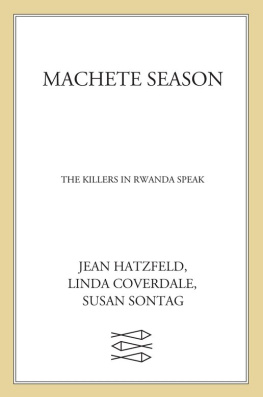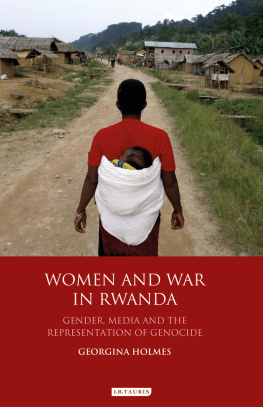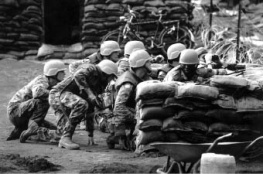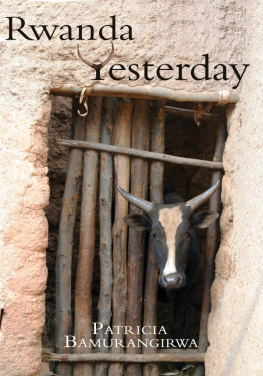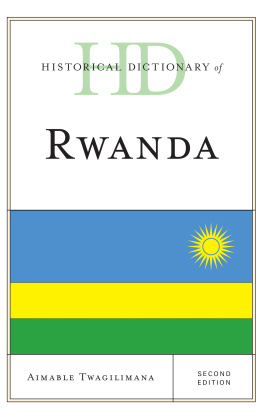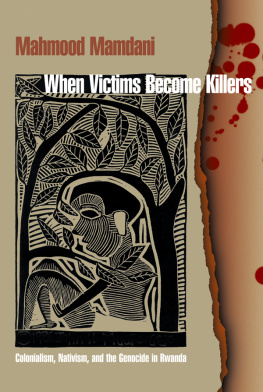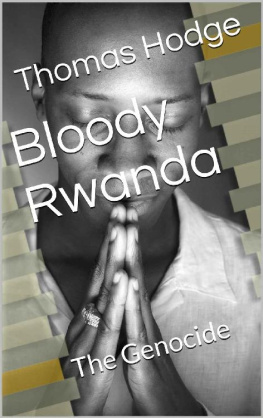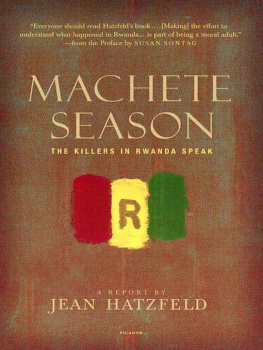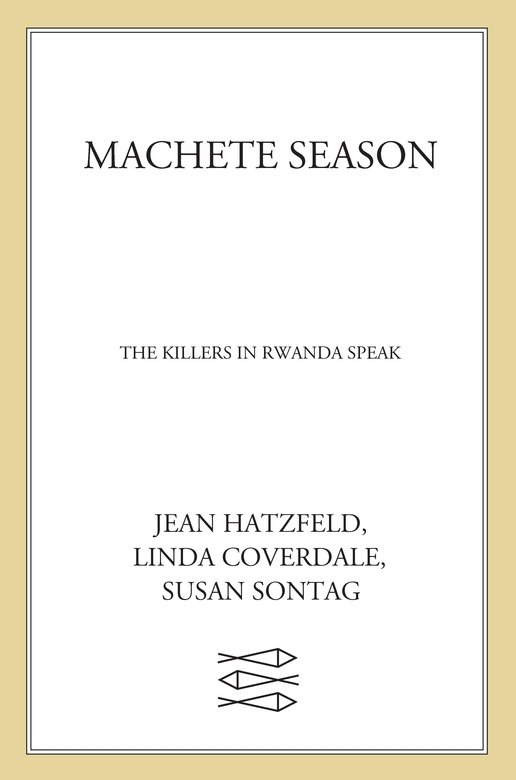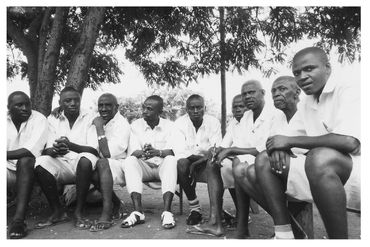When the interviews were over, I suggested to the gang that we take a photograph of them. I told them it would be published, so that readers could attach faces to their accounts. I thought the men would have reservations, but they readily agreed, except for Adalbert, who refused even to discuss it and was absent on the day the picture was taken. The photo shows them on the benches in the garden where my interviews took place. Its like one of those commemorative photographs celebrating a departure or the end of something.
From left to right: Joseph-Dsir, Lopord, lie, Fulgence, Pio, Alphonse, Jean-Baptiste, Ignace, and Pancrace.
JOSEPH-DSIR BITERO
He was born on the hill of Kanazi to parents who were farmers, and at the time of the killings he was thirty-one years old. As a cousin of the burgomaster, he had joined the MRND, President Habyarimanas party, at an early age. He is married and the father of two children who live on the family farmland. A graduate of a teachers training college, he taught and lived in Nyamata. He was in charge of the MRND partys youth movement and in 1993 was named municipal president of the interahamwe , the most important Hutu extremist militia.
As such, he is the only member of the gang to have been implicated in the preparation of the genocide several months before it began. After his conviction, his house in the Gatare neighborhood in Nyamata was confiscated to pay his fines. His wife was not prosecuted, but she has not been able to return to her job at the Sainte-Marthe Maternity Hospital. With her two daughters, she returned to live in a family house in Kanazi to cultivate their fields there.
Accused of crimes of genocide and crimes against humanity with premeditation, Joseph-Dsir was prosecuted individually at a trial in the municipal court of Nyamata that was very closely followed. The court rejected his superficial and contradictory confessions for their lack of sincerity, and he was condemned to death on July 3, 1998. His appeal of the sentence was rejected by the supreme court in Kigali. Because of a delay in his sentencing, he escaped the public execution of April 24, 1998; his probable fate will be life in prison, at least so long as the current rgime of President Paul Kagame remains in power.
LOPORD TWAGIRAYEZU
He was born in Muyange, on the hill of Maranyundo. He was twenty-two at the time of the killings, a son of farmers, like allthe others in the gang. He has four sisters. He attended elementary school, then worked in the family fields. Like Joseph-Dsir Bitero, he was a member of the MRND, but only for two years, and he had no real responsibilities. He has been a fervent Catholic since childhood.
Accused of crimes of genocide and crimes against humanity, he pleaded guilty to numerous murders and acts committed in his capacity as a cell leader. In 2001 the municipal court in Nyamata sentenced him to seven years in prison. The importance of his confession and the effectiveness of his cooperation with the police and judicial authorities during the preliminary investigation of his case explain why his sentence was lighter than those of his companions. He did not appeal it.
He served almost all of his sentence (having been in prison since 1995) and was released in December 2002 without being sent on to a reeducation camp. His neighbors greeted him with insults and threats during an official ceremony of forgiveness, however, and he has not yet returned to his home on the hill of Maranyundo.
LIE MIZINGE
He was born in Gisenyi, in western Rwanda, near the Congolese border. Fifty years old at the time of the killings, he was quite familiar with the ancien rgime, since he was fourteen at the death of the last Tutsi king, before independence. A soldier, he arrived in the Bugesera in 1974 to invest his savings in land and found a suitable plot in Karambo, on the hill of Muyenzi. He left the army, joined the municipal police force, then hung up his uniform to become a farmer in 1992, when he was more or less dismissed in the aftermath of a murder. He is married; two of his three children are dead.
The preliminary investigation of his case is over, but he wasnot tried with his friends, doubtless because of his past career as a soldier and policeman. He will probably be brought up before a gaaa , a peoples court, and will likely be sentenced at most to two or three years of community service, which means probation, plus three days of unpaid work each week in a private business or government office. For now he is in the camp at Bicumbi, where he attends civics classes with his comrades. Upon his release, he will await his trial at home, not in prison.
FULGENCE BUNANI
He was born in the Gitarama region, and like all his pals in the gang, he is the son of farmers. Thirty-three years old at the time of the killings, he was thirty-nine when the interviews began. After completing elementary school, he became a farmer in Kiganwa, on the hill of Kibungo. A fervent Catholic, he served as a voluntary deacon during lesser rites in the church in Kibungo and filled in for the priest, who had to minister to several parishes. Fulgences wife and two young children live on their plot of land.
Fulgence was one of some forty prisoners tried by the municipal court of Nyamata, which sits in a building near the penitentiary, far from the hills and the town itself. Accused of crimes of genocide and crimes against humanity, he pleaded guilty to aiding and abettingmurder. The court accepted his plea and on March 29, 2002, sentenced him to twelve years in the Rilima penitentiary. He did not appeal the sentence to the supreme court in Kigali. Following the presidential decree of January 1, 2003, intended to diminish the prison population drastically, he was released on January 21 after six years in prison and placed for four months in a reeducation camp in Bicumbi, in northeastern Nyamata. He was released on probation on May 5, 2003, and went home to Kiganwa.
PIO MUTUNGIREHE
He was born in Nyarunazi, on the hill of Kibungo. Twenty years old at the time of the killings, he is unmarried, from a family of four brothers and sisters. He played on the mixed soccer team of Kibungo, was a fan of the Bugesera Sports soccer team, and was a dedicated member of the Kibungo Choral Society. After finishing elementary school, he worked in the family fields located between Nyarunazi and Kiganwa.
He was tried along with Fulgence, Pancrace, and Adalbert. He pleaded guilty to certain murders and on March 29, 2002, was sentenced to the same punishment as his friends: twelve years in prison. He did not appeal the sentence. He too was sent to the reeducation camp in Bicumbi for four months and, like the others, was released on May 5, 2003, free and exempt from any community labor, like all those in the gang aside from lie and Alphonse.
In tiptop shape, he is eager to take up soccer again.
ALPHONSE HITIYAREMYE
He was born in the province of Kibuye, west of Nyamata. In 1977 he was brought to the Bugesera as a hired field worker by a Tutsi landowner. He later bought his own plot of land in Nyamabuye, between the hills of Kanzenze and Kibungo. He alsoowned a business in Kanzenze that did wellhe has a good head for such things. He was thirty-nine the year of the killings. Married, he is the father of four children. He was a good soccer player and a good Catholic. His wife lives and works on their plot of land.

